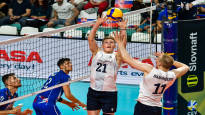Urheilu’s expert Mikko Esko has mixed feelings about the changes to the World Volleyball Championships.
The International Volleyball Federation has made changes regarding the upcoming value competitions. The World Volleyball Championships will be played every two years from 2025, while until now they have been played like the Olympics every four years. The number of participants in the World Cup will also be increased from 24 to 32 teams.
Sports expert Mikko Esko has a conflicted attitude towards changes. He finds both good and bad points in them.
– The fact that it is played every four years increases the prestige of the competition, says Esko.
He compares the situation through, for example, the soccer and ice hockey World Cups. In soccer, the world championship is awarded every four years, in ice hockey every year. In Esko’s opinion, the annual competitions do not enjoy the same prestige, and probably neither do the competitions organized every other year.
– I personally would have preferred the old system. It would have been better in terms of the prestige of the World Championship and the World Cup.
However, in terms of the sport’s visibility, it might be good that there are more value competitions and thus there are more organizers in the competitions. The expansion of the games to 32 teams also makes the sport visible and closer to more people.
Esko hopes that the participation of more countries is a good thing for volleyball, but he also reminds us of the other extreme.
– When there are more teams, lower-level countries will join and some matches may become really uneven. Not everyone has the level to compete against the top countries.
Great screen positions for Finnish players
From the point of view of Finland, Mikko Esko thinks the changes are only good. Finland’s men’s situation is currently so good that the World Cup place would be determined based on the ranking. On the women’s side, the team still has to rapidly improve its ranking for the coming years.
In the last couple of years, the men’s team has undergone a generational change and the team has clearly gotten younger. In the just ended Golden League, Finland finished sixth, but will receive reinforcements from a more experienced guard for the autumn European Championships.
On the women’s side, the team is looking for a new rise under the leadership of a new coaching team. Coached the team since 2014 Tapio Kangasniemi moved to the association’s sports director and the Swiss Nicholas Buser took the reins. In August, Finland, which will be playing in the European Championship for the third time in a row, is also aiming for a place in the European League in the future. The team has not played in the league since it was relegated to the Silver League two years ago due to the corona virus.
In Esko’s opinion, the Finnish men’s team has gone in the right direction, so playing in prestigious competitions is extremely important.
– Now Finland has a better chance of making it to the World Cup. It is really important that the team has a goal for each season, and there should be no summers in between.
The increase in prize competitions also increases the backlog of matches. This is a problem especially for players playing in the top leagues, but Esko stands by his position that increasing the number of tough matches is important for the Finnish national volleyball team.
– One player may not be able to withstand that intense and continuous pressure for many years without taking a break, but for young Finnish players these are great screen opportunities.
The Olympic dream should be lived by as many as possible
If the number of World Cups is increased in the coming years, the International Volleyball Federation will also reduce the number of matches. There are no separate qualifying tournaments for the 2028 Olympics in Los Angeles. Places are allocated on the basis of, among other things, continental champions, World Championships and ranking.
Mikko Esko finds this solution strange.
– It would be nice if the Olympic dream lived in as many countries as possible. Finland has always had that too, Esko says and reminds that removing the qualifying tournaments affects the World Championships as well.
– There is even greater pressure on them when they are also playing for an Olympic place.
